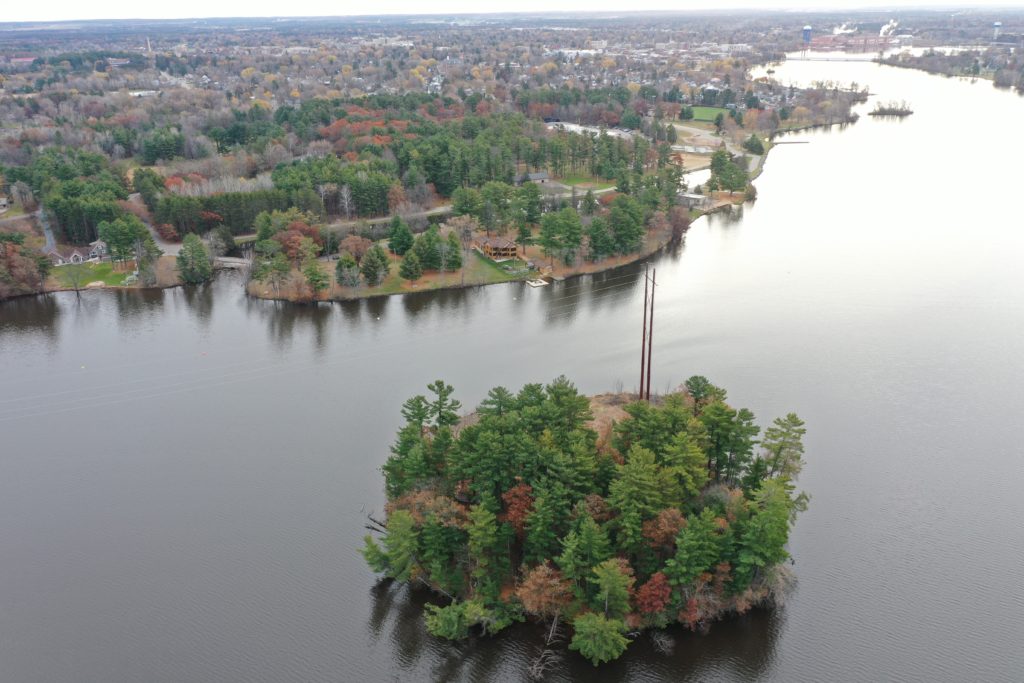North Central Conservancy Trust (NCCT) recently received a $5,000 grant from American Transmission Co.’s Pollinator Habitat Program to help support a restoration project to revegetate a nearly one-acre area with native, pollinator-friendly plants on Bukolt Island during the spring and summer of 2022.
Bukolt Island, also known as Annabel Lee or Kulas Island, is located west of Bukolt Park in the Wisconsin River. NCCT purchased the 2-acre island, along with their 5-acre mainland property located just north of Bukolt Park in 2019 through a partnership with the Green Circle Trail and the City of Stevens Point.
During the fall of 2021, ATC cut and cleared brush from a 0.96-acre area beneath the ATC electric transmission line that runs through the southern half of the island to comply with vegetation management safety guidelines. As part of its management goals for the island property, NCCT seeks to complement ATC’s work by revegetating the area with low-growing, native plant species starting in the spring of 2022. Low-growing perennials and grasses can thrive within transmission line rights-of-way and won’t interfere with overhead transmission lines.
Planting native, perennial plant species in this area will attract a diversity of pollinators and reduce future vegetation management requirements for ATC and NCCT. In addition, native plants will help to prevent the spread of harmful invasive species and slow the reestablishment of incompatible, tall-growing vegetation. Native plants will also help to reduce negative impacts to water and site quality.
“We’re excited to begin restoring this section of the island as part of our long-term management plan,” said Chris Radford, Executive Director of NCCT. “With the grant from ATC, we’ll be able to begin creating a
beautiful habitat for bees, birds, butterflies, and other pollinators with native, pollinator-friendly plants, hopefully establishing a self-sustaining and diverse plant population.”
ATC’s Pollinator Habitat Program promotes planting low-growing vegetation within a transmission line right-of-way to beautify communities in a way that doesn’t compromise the safety and reliability of the electric transmission system.
“Part of the reason for the recent decline in pollinator populations is due to loss of habitat,” said ATC Environmental Project Manager Johanna Sievewright. “The Pollinator Habitat Program promotes vegetation that is both compatible with our vegetation management practices and it provides habitat for pollinators, which use the utility corridor as a flight path.”
In addition to the Pollinator Habitat Program, ATC’s Community Planting Program provides financial support to eligible cities, villages, towns, counties, and tribes in ATC’s service area for planting projects on public property. Program funds can be used to plant trees and other tall-growing vegetation outside the transmission line rights-of-way. ATC has awarded nearly 290 communities and organizations with funds totaling nearly $500,000 since 2013.
To qualify for either program, communities must ensure that all current and future planting plans and urban forestry activities near high-voltage electric transmission lines
will comply with ATC’s maintenance standards. Cities, villages, towns, counties, and tribes within ATC’s service area are eligible to apply for funding through the Community Planting Program. The Pollinator Habitat Program also is open to cities, villages, towns, counties and tribes within ATC’s service area, as well as to entities that allow public access to ATC rights-of-way (e.g. nature preserves, non-profits or public land managers).
ATC accepts applications from June 1 through Sept. 30, and award recipients are selected and notified by the end of the year. Awards for both programs range from $100 to $5,000. Additional information and program applications can be found at atc-GrowSmart.com.
Also reported in the Portage County Gazette on January 27, 2022
https://stevenspoint.news/2022/01/25/north-central-conservancy-trust-receives-5000-grant/

